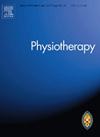The effects of a prescribed exercise programme in people with metastatic breast cancer: a systematic review
IF 3.1
3区 医学
Q1 REHABILITATION
引用次数: 0
Abstract
Objective
To synthesise available evidence on the effects of a prescribed exercise programme in People with Metastatic Breast Cancer (PwMBC).
Data sources
Medline, Embase, CINAHL, Web of Science and Scopus were searched up to January 2024.
Study selection
Randomised controlled trials (RCTs) recruiting PwMBC to an exercise intervention were included. The primary outcome was Quality of Life (QOL). Secondary outcomes included physical performance, muscle health, cancer-related fatigue (CRF) and physical activity (PA).
Study appraisal and synthesis methods
Meta-analysis was not possible due to the low number of included studies. We calculated the effect size (ES), with 95% confidence intervals (95% CIs) of individual studies, adjusting for small sample size. Cohen’s criteria for small (0.2 to 0.5), moderate (0.5 to 0.8) and large (>0.8) describe the size of the effect. Risk of bias (ROB) was assessed using the Cochrane (ROB) version 1 tool.
Results
Three RCTs (n = 149 PwMBC) were included. Results showed no significant between-group effects in the primary outcome, QOL. Whilst effects in favour of prescribed exercise were observed in CRF (ES 1.3, 95% CI 0.06 to 2.35) and PA (ES 0.83, 95% CI 0.14 to 1.42) in two separate studies, as the lower bound of the 95% CI did not reach Cohen’s threshold, there is considerable uncertainty regarding the treatment effect.
Conclusions
There is currently insufficient evidence to support the use of prescribed exercise to improve QOL, physical performance, muscle health, CRF and PA in PwMBC. Further high-quality trials are required to investigate the effectiveness of exercise interventions in PwMBC.
Systematic Review Registration Number
PROSPERO CRD42022304528.
Contribution of the Paper
- •Despite guidelines and recommendations on the positive role of exercise, the evidence for prescribed exercise programmes for PwMBC is limited.
- •This systematic review of three trials found insufficient evidence to support the use of prescribed exercise to improve QOL, physical performance, muscle health, CRF and PA in PwMBC.
- •Further high-quality, adequately powered trials are required to investigate the effectiveness of exercise interventions on QOL, CRF, PA, physical performance and muscle health in PwMBC.
转移性乳腺癌患者参加规定运动计划的效果:系统综述
数据来源Medline、Embase、CINAHL、Web of Science 和 Scopus,检索时间截至 2024 年 1 月。研究选择纳入了招募转移性乳腺癌患者参加运动干预的随机对照试验(RCT)。主要结果为生活质量(QOL)。研究评估和综合方法由于纳入的研究数量较少,因此无法进行荟萃分析。我们计算了各项研究的效应大小(ES)和 95% 置信区间(95% CI),并对小样本量进行了调整。科恩标准中的小效应(0.2 至 0.5)、中效应(0.5 至 0.8)和大效应(0.8)描述了效应的大小。使用 Cochrane (ROB) 第 1 版工具评估了偏倚风险 (ROB)。结果显示,在主要结果 QOL 方面,组间效应不明显。虽然在两项单独的研究中观察到处方运动在 CRF(ES 1.3,95% CI 0.06 至 2.35)和 PA(ES 0.83,95% CI 0.14 至 1.42)方面的效果,但由于 95% CI 的下限未达到 Cohen 临界值,因此治疗效果存在相当大的不确定性。结论目前没有足够的证据支持使用处方运动来改善 PwMBC 的 QOL、身体表现、肌肉健康、CRF 和 PA。系统综述注册号PROSPERO CRD42022304528.Contribution of the Paper--尽管指南和建议都指出了运动的积极作用,但针对男性和女性乳腺癌患者的处方运动计划证据有限。-本文对三项试验进行了系统性回顾,发现没有足够的证据支持使用处方运动来改善男性和女性残疾人的 QOL、身体表现、肌肉健康、CRF 和 PA。
本文章由计算机程序翻译,如有差异,请以英文原文为准。
求助全文
约1分钟内获得全文
求助全文
来源期刊

Physiotherapy
医学-康复医学
CiteScore
6.40
自引率
3.00%
发文量
377
审稿时长
82 days
期刊介绍:
Physiotherapy aims to publish original research and facilitate continuing professional development for physiotherapists and other health professions worldwide. Dedicated to the advancement of physiotherapy through publication of research and scholarly work concerned with, but not limited to, its scientific basis and clinical application, education of practitioners, management of services and policy.
We are pleased to receive articles reporting original scientific research, systematic reviews or meta-analyses, theoretical or debate articles, brief reports and technical reports. All papers should demonstrate methodological rigour.
 求助内容:
求助内容: 应助结果提醒方式:
应助结果提醒方式:


